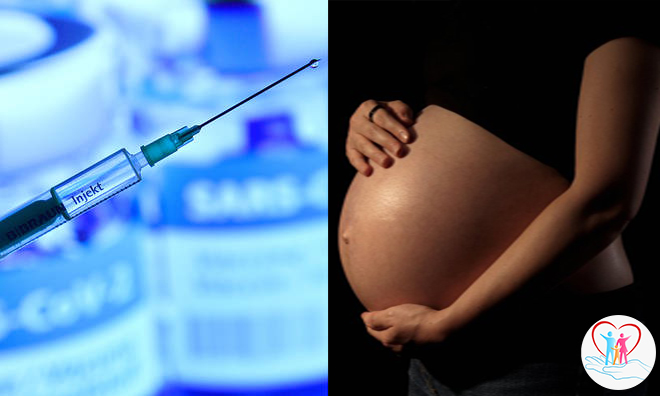Vaccination Considerations for Women who are Pregnant or Breastfeeding
Centers for disease control and prevention(CDC) and the independent Advisory Committee on Immunization Practices (ACIP) have provided information to assist pregnant women with their decision to receive the COVID-19 vaccine. At this time, ACIP recommends that certain groups (e.g., healthcare personnel, followed by other frontline essential workers) are offered vaccination during the first months of the COVID-19 vaccination program. Women who are pregnant and part of a group recommended to receive the COVID-19 vaccine may choose to be vaccinated. If they have questions about getting vaccinated, a discussion with a healthcare provider might help them make an informed decision.
Pregnant people are at increased risk for severe illness from COVID-19
Observational data demonstrate that, while the chances for these severe health effects are low, pregnant people with COVID-19 have an increased risk of severe illness, including illness that results in ICU admission, mechanical ventilation, and death compared with non-pregnant women of reproductive age. Additionally, pregnant people with COVID-19 might be at increased risk of adverse pregnancy outcomes, such as preterm birth, compared with pregnant women without COVID-19.
There are limited data about the safety of COVID-19 vaccines for people who are pregnant
Until findings are available from clinical trials and additional studies, only limited data are available on the safety of COVID-19 vaccines, including mRNA vaccines, administered during pregnancy:
- Limited data are currently available from animal developmental and reproductive toxicity studies. No safety concerns were demonstrated in rats that received Moderna COVID-19 vaccine before or during pregnancy; studies of the Pfizer-BioNTech vaccine are ongoing.
- Studies in people who are pregnant are planned.
- Both vaccine manufacturers are monitoring people in the clinical trials who became pregnant.
CDC and the Food and Drug Administration (FDA) have safety monitoring systems in place to capture information about vaccination during pregnancy and will closely monitor reports.
mRNA vaccines do not contain the live virus that causes COVID-19 and, therefore, cannot give someone COVID-19. Additionally, mRNA vaccines do not interact with a person’s DNA because the mRNA does not enter the nucleus of the cell. Cells break down the mRNA quickly. Based on how mRNA vaccines work, experts believe they are unlikely to pose a specific risk for people who are pregnant. However, the actual risks of mRNA vaccines to the pregnant person and her fetus are unknown because these vaccines have not been studied in pregnant women.
Getting vaccinated is a personal choice for people who are pregnant
People who are pregnant and part of a group recommended to receive COVID-19 vaccine, such as healthcare personnel, may choose to be vaccinated. A conversation between pregnant patients and their clinicians may help them decide whether to get vaccinated with a vaccine that has been authorized for use under Emergency Use Authorization (EUA). While a conversation with a healthcare provider may be helpful, it is not required prior to vaccination.
Key considerations pregnant patients can discuss with their healthcare provider include:
- The likelihood of exposure to SARS-CoV-2, the virus that causes COVID-19
- Risks of COVID-19 to them and potential risks to their fetuses
- What is known about the vaccine: how well it works to develop protection in the body, known side effects of the vaccine, and lack of data during pregnancy
Pregnant patients who decide to get vaccinated should continue to follow the current guidelines to prevent the spread of COVID-19 after they are vaccinated. That means:
- Wearing a mask
- Staying at least six feet away from others
- Avoiding crowds
- Washing hands with soap and water for 20 seconds or using hand sanitizer with at least 60% alcohol
- Following CDC travel guidance
- Following quarantine guidance after exposure to COVID-19
- Following any applicable workplace guidance
Vaccine side effects
Side effects can occur after receiving either of the two available COVID-19 vaccines, especially after the second dose. These side effects are not expected to be any different for pregnant people than for non-pregnant people. Pregnant people who experience fever following vaccination may be counseled to take acetaminophen because fever has been associated with adverse pregnancy outcomes. Acetaminophen may be offered as an option for pregnant women experiencing other post-vaccination symptoms as well.
Some people have experienced allergic reactions after receipt of the vaccine. CDC recommends that all vaccine recipients, including pregnant people, should talk with their healthcare provider if they have a history of severe allergic reaction (e.g., anaphylaxis) to any other vaccine or injectable therapy (e.g., intramuscular, intravenous, or subcutaneous). Key considerations to inform these discussions include the unknown risks of developing a severe allergic reaction and the benefits of vaccination.
Routine testing and pregnancy
Routine testing for pregnancy before COVID-19 vaccination is not recommended. Women who are trying to become pregnant do not need to avoid pregnancy after receiving an mRNA COVID-19 vaccine.
COVID-19 vaccination considerations for people who are breastfeeding
There are no data on the safety of COVID-19 vaccines in lactating women or on the effects of mRNA vaccines on the breastfed infant or on milk production/excretion. mRNA vaccines are not thought to be a risk to the breastfeeding infant. People who are breastfeeding and are part of a group recommended to receive a COVID-19 vaccine, such as healthcare personnel, may choose to be vaccinated.

